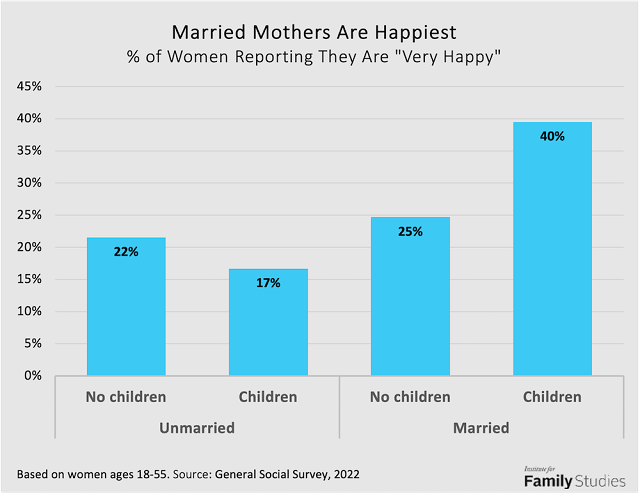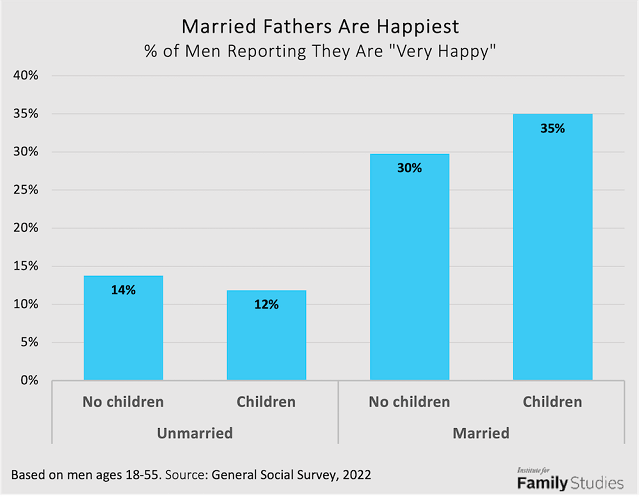Who Is Happiest? Married Mothers and Fathers, Per the Latest General Social Survey
4 min read
Date Published: 09/27/2023
Last Updated: 09/27/2023
National Fatherhood Initiative Blog / Latest Articles
4 min read

This article is written by W. Bradford Wilcox and Wendy Wang for the Institute for Family Studies. It is republished here with permission from the authors.
Social media and mainstream media are replete with stories suggesting marriage and parenthood are not fulfilling, especially for women. Not surprisingly, many Americans now believe the key to being happy is a good education, work, and freedom from the encumbrances of family life—not getting married and having a family. These cultural developments raise an important question answered by this Institute for Family Studies research brief: Are single, childless women and men truly the happiest, or are women and men today who are married with children happier?

The 2022 edition of the General Social Survey (GSS)—the nation’s preeminent social barometer—reveals that marriage and family are strongly associated with happiness. The GSS shows that a combination of marriage and parenthood is linked to the biggest happiness dividends for women. Among married women with children between the ages of 18 and 55, 40% reported they are “very happy,” compared to 25% of married childless women, and just 22% of unmarried childless women.
Nevertheless, it is important to note that unmarried mothers are the least likely to be very happy: with just 17% of them indicating they are very happy. These results parallel findings from 2020 and 2021 during the pandemic that we reported last year in The Atlantic. In earlier surveys, we found that women who were married with children were generally the happiest and the least lonely.
But what about men? Is the link between happiness, marriage, and parenthood similar for men? Indeed, the 2022 General Social Survey indicates that marriage is also linked to greater happiness for men ages 18-55. And here again, married fathers are happiest.

Specifically, 35% of married men ages 18-55 who have children report being “very happy,” followed by 30% of married men who do not have children. By contrast unmarried childless men, and especially unmarried fathers are the least happy—with less than 15% of these men saying they are “very happy.” In other words, married men (ages 18-55) in America are about twice as likely to be very happy, compared to their unmarried peers.
These results parallel other recent research from the University of Chicago indicating that for both men and women, marriage is “the most important differentiator” of who is happy in America. Meanwhile, falling marriage rates are a chief reason why happiness has declined nationally, according to that same study. The research found an astounding 30-percentage-point happiness gap between married and unmarried Americans.
Other factors do matter—including income, educational achievement, race, and geography—but marital status is most influential when it comes to predicting happiness in the study. What’s more, other research indicates that the United States is witnessing a growing happiness divide between the most educated and least educated Americans, and marriage is likely the biggest driver of that decline.
Social psychologist Jean Twenge attributes the growing happiness divide in America along class lines to a faster decline in marriage among those with less education and income. In Twenge’s view,
The growing class divide in happiness clearly has many causes, including income inequality. Still, relationships are also crucial for happiness, and for many people, marriage is their primary and most stable relationship.
This new IFS research brief provides further evidence that happiness is linked to American family life. In particular, and contrary to the views articulated by many on social media, the mainstream media, and the American public, marriage and parenthood do not appear to be obstacles to living a happy life. Instead, these two traditional markers of adulthood are associated with a happier life. As difficult as marriage and parenthood can be, in general, men and women who have the benefit of a spouse and children are the most likely to report that they are “very happy” with their lives, according to the most recent round of the General Social Survey.
Authors

W. Bradford Wilcox (Princeton University, Ph.D.) is a senior fellow at the Institute for Family Studies, Director of the National Marriage Project at the University of Virginia, and a Visiting Scholar at the American Enterprise Institute. The coeditor of Gender and Parenthood: Biological and Social Scientific Perspectives (Columbia University Press, 2013), Wilcox conducts research on marriage, cohabitation, fatherhood, and the welfare of children. |

Wendy Wang (Ph.D., University of Maryland) is director of research at the Institute for Family Studies. Dr. Wang is a former senior researcher at Pew Research Center, where she conducted research on marriage, gender, work, and family life in the United States. She was the lead author of the Pew Research Center report, Breadwinner Moms, among other Pew reports. |
Date Published: 09/27/2023
Last Updated: 09/27/2023
Download this free guide for a proven 7-step roadmap—from making the case and securing funding for your program, to launching and measuring real results!


Train Your Staff
Fatherhood Programs
Fatherhood Data
© 2026 National Fatherhood Initiative®. All rights reserved.